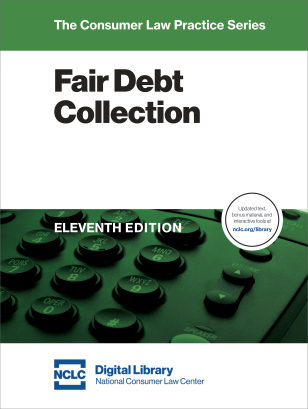This article summarizes six new reported FDCPA appellate decisions handed down mid-November, 2015 though early January, 2016. In addition, FDCPA practitioners should be aware of the following:
- The Supreme Court’s decision in Campbell-Ewald Co. v. Gomez, ___ U.S. ___, 2016 WL 228345 (Jan. 20, 2016), clarifying certain TCPA issues as discussed in this article and making it much more difficult for defendants to moot out class actions by trying to settle with class representatives, as discussed in this other article.
- Thirteen other recent (but slightly older) FDCPA decisions listed in this article.
The six very recent and the thirteen other recent FDCPA appellate decisions are all examined in more detail in the online version of NCLC’s Fair Debt Collection. Search for the case name or use the links below. Checking “Highlight Updates" on a page shows only recent developments.
FDCPA COVERAGE
FDCPA Protects Sophisticated Consumers Too
Benzemann v. Citibank, 806 F.3d 98 (2d Cir. 2015). The FDCPA “enlists the efforts of sophisticated consumers ... as ‘private attorneys general’ to aid their less sophisticated counterparts, who are unlikely themselves to bring suit under the Act, but who are assumed by the Act to benefit from the deterrent effect of civil actions brought by others." (citations omitted) See § 4.5
FDCPA PROTECTIONS
Deceptive and Unfair to Collect Debt Discharged in Bankruptcy
Garfield v. Ocwen Loan Servicing, LLC, --- F.3d ----, 2016 WL 26631 (2d Cir. Jan. 4, 2016). The attempt by the mortgagee to collect mortgage payments discharged in bankruptcy violated both the Bankruptcy Code discharge injunction and the FDCPA-there was no conflict between the two. See §§ 5.5.2.13.5, 5.5.4.4, 5.5.8.6, 5.5.11, 5.5.14.1, 5.6.2, 5.7.2.5.1
Invoice After Verification Request Violates FDCPA
Leeb v. Nationwide Credit Corp., 806 F.3d 895 (7th Cir. 2015). Collection agency failed to cease collection of the debt, after receiving a dispute letter from the consumer, when the collector mailed the consumer a request for payment violating §1692g(b). The consumer’s request for confirmation from the collector that it received the consumer’s dispute letter did not excuse the collector’s letter that requested payment, as well as requesting more information from the consumer. See § 5.7.3.4
Technically False, Harmless Statement OK
Janson v. Katharyn B. Davis, LLC , 806 F.3d 435 (8th Cir. 2015). When no one is mislead by a collector’s “technically" false statement, there is no violation of § 1692e or f. The affidavit of the landlord’s attorney filed in a state eviction action falsely swore that the attorney had personal knowledge of the fact that the tenant had failed to pay specified rent. While this was “technically" false because the attorney obtained that information from the landlord, neither the state court or the consumer were mislead by that statement and the recitations in the affidavit about the nonpayment of rent and were not claimed to be false. The opinion first found the FDCPA claim was not barred by Rooker Feldman as it did not attack the state eviction and rent judgment. See §§ 5.5.2.13.4, 5.6.1, 5.6.2, 7.4.4
FDCPA REMEDIES
FDCPA Class Alleging Collection of Time Barred Debts Should Have Been Certified
McMahon v. LVNV Funding, LLC, 807 F.3d 872 (7th Cir. 2015). Reversed the district court’s refusal to certify FDCPA class alleging that debt buyer’s letters offering settlements on time barred debts violated the FDCPA. The Seventh Circuit had previously reversed the district court’s dismissal of that FDCPA claim. The court found the lower court’s reasoning on predominance to be inconsistent and overstated and that it failed to consider bifurcation to deal with any individual damages issues. See § 6.6.2.3.4
Foreclosure Not Defeated by Homeowner’s Prior FDCPA Suit
Bauman v. Bank of America, N.A., --- F.3d ----, 2015 WL 9310136 (6th Cir. Dec. 23, 2015). Denied the homeowner’s claim for a declaratory judgment that the mortgagee had waived its right to foreclosure against their house when it failed to file a foreclosure counterclaim in the homeowner’s prior FDCPA suit against the mortgagee as a foreclosure counterclaim would be permissive and not mandatory in the prior FDCPA suit, as the claims involved many different issues and evidence. See § 7.4.2
FDCPA Statute of Limitations Runs from Restraint of Bank Account
Benzemann v. Citibank, 806 F.3d 98 (2d Cir. 2015). Reversed the dismissal based upon the statute of limitations where the collection attorney allegedly violated §§ 1692e and f by wrongfully issuing a restraining notice against the wrong consumer’s bank account for a second time. The FDCPA claim did not accrue when the notice was issued, but instead accrued later when the consumer’s bank froze his account, since the plaintiff, at that point, suffered injury and had the right to sue. See § 6.10.3
Bona Fide Error Defense Fails
Leeb v. Nationwide Credit Corp., 806 F.3d 895 (7th Cir. 2015). Following Jerman the court found that the mailing of the letter violating §1692g(b) was not an error as it was mailed intentionally, not by mistake. It may not have been sent willfully, as it was not sent with the intent to violate the FDCPA, but it was sent intentionally. The collector did not show that the letter was sent by mistake, although collector showed that sending that letter was against the collector’s policies after the consumer properly disputed the letter under §1692g. Employee training on the law was not an adequate procedure to reasonably avoid the error as the employee’s mistake of law is not considered an error under Jerman. The collector failed to show it had a policy specifically stating what action was to be taken by its employee after receiving the dispute letter and therefore failed to adequate procedures to avoid the error. See §§ 7.2.2, 7.2.4, 7.2.7, 7.2.8


